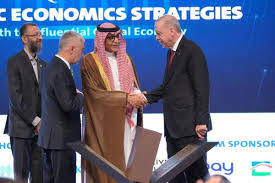The city of Istanbul became the global centre of Islamic economic discourse on Friday as the second edition of the Global Islamic Economy Summit commenced, drawing attention from world leaders, economists, and policy shapers. The high-level event, hosted by the Al Baraka Forum for Islamic Economy, was formally opened in the presence of Turkish President Recep Tayyip Erdoğan, underscoring its significance on the international stage.
Addressing participants during the opening session, Chairman of the Board of Trustees of the Al Baraka Forum, Sheikh Abdullah Saleh Kamel, delivered a powerful message on the deep historical and spiritual origins of the Islamic economic system. According to Kamel, the roots of what is today known as Islamic economy were first planted in Madinah, the Prophet’s city, where principles such as fair trade, social equity, and ethical finance were put into practice over 1,400 years ago.
He emphasized that Saudi Arabia, as the custodian of the two holy mosques and the birthplace of Islam, has historically played a central role in shaping and institutionalizing the Islamic economy based on the values of justice, equity, and sustainable development. He recalled that the first meetings of the Al Baraka Forum were convened in Madinah over five decades ago, laying the groundwork for what has become a growing global movement towards a values-driven financial system.
With the world now facing complex economic challenges, Kamel called on Saudi Arabia to further its strategic leadership and enhance its contributions to the Islamic economic architecture. He argued that the time is ripe for Islamic finance to offer viable and inclusive alternatives, particularly through instruments like zakat (obligatory charity), waqf (endowments), sukuk (Islamic bonds), and qard hasan (interest-free loans). These tools, he said, are not just rooted in Islamic law but also offer practical solutions for poverty alleviation, wealth redistribution, and fostering long-term financial resilience.
The summit, which runs until Sunday, has attracted participation from thought leaders, researchers, government officials, and private sector stakeholders from across the Muslim world and beyond. Discussions are centred on building robust financial ecosystems anchored in Islamic ethics and geared toward addressing contemporary developmental needs.
The Al Baraka Forum for Islamic Economy, the body behind the summit, is a globally recognized, non-profit platform dedicated to advancing the Islamic economic model. Through its research, advocacy, and annual gatherings, it seeks to develop innovative economic policies and thought leadership that align with Islamic values and contribute to the broader goals of human dignity, justice, and sustainable growth.
As the global economy continues to evolve, the call from Istanbul is clear: the Islamic economy, with its deep historical roots and principled framework, offers a unique and compelling roadmap for building a more equitable and compassionate financial future.
